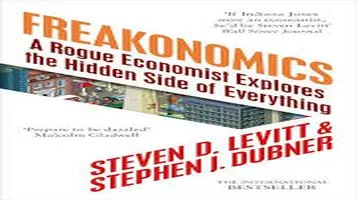Unveiling the Hidden Side of Everything: A Review of Freakonomics Radio
Freakonomics Radio is an educational podcast that delves into the hidden side of everything, exploring the intersection of economics, human behavior, and everyday life. Hosted by Stephen J. Dubner, co-author of the bestselling "Freakonomics" book series, the podcast offers a fresh and engaging perspective on complex topics. Each episode features interviews with experts, thought leaders, and unconventional thinkers, unraveling the intricate patterns and incentives that shape our world. With its curious, analytical approach, Freakonomics Radio covers a wide array of subjects, from the economics of sleep to the psychology of decision-making, making it accessible and intriguing for listeners who enjoy learning and questioning conventional wisdom. The podcast is ideal for anyone interested in understanding the underlying factors that drive societal trends and personal choices.

In a world overflowing with podcasts, Freakonomics Radio stands out as a beacon for intellectually curious individuals eager to explore the hidden side of everything. Hosted by Stephen J. Dubner, co-author of the best-selling Freakonomics books, this podcast delves into the nooks and crannies of economics, psychology, and social science, offering a fresh perspective on a wide array of topics. After immersing myself in numerous episodes, I can attest that Freakonomics Radio is not only educational but also incredibly engaging, making complex subjects accessible to a broad audience.
Content and Themes
Freakonomics Radio prides itself on exploring the unconventional and often surprising ways economic principles can be applied to everyday life. The podcast's tagline, "the hidden side of everything," is a clear indication of its mission to challenge conventional wisdom and reveal the underlying mechanics of various phenomena.
Episodes often feature interviews with leading experts, including economists, psychologists, sociologists, and even everyday people who offer unique insights into the subject matter. Topics range from the economics of sleep to the efficacy of various public policies, and even the psychology behind why we make certain decisions. This diversity keeps the content fresh and ensures there is something for everyone, regardless of their background or interests.
Educational Value
One of the standout features of Freakonomics Radio is its educational value. The podcast excels at breaking down complex concepts into digestible pieces, making it accessible to listeners who may not have a background in economics or social science. For instance, an episode might explore the concept of opportunity cost by examining real-world scenarios, making it easier for listeners to grasp and apply the idea in their own lives.
The podcast also encourages critical thinking and skepticism. Rather than accepting things at face value, Dubner and his team delve deeper, asking probing questions and examining the data. This approach not only informs listeners but also empowers them to question their own assumptions and consider alternative viewpoints.
Production Quality
The production quality of Freakonomics Radio is top-notch. Each episode is meticulously crafted, with a well-balanced mix of interviews, narration, and sound effects that keep the listener engaged from start to finish. The editing is seamless, and the pacing is just right, ensuring that the content is neither too fast for comprehension nor too slow to maintain interest.
Stephen Dubner's narration is another highlight. His voice is both authoritative and friendly, striking the perfect balance between being informative and conversational. Dubner has a knack for asking the right questions and guiding the conversation in a way that brings out the most interesting and relevant points from his guests.
Engagement and Community
Freakonomics Radio has built a strong community of listeners who are passionate about learning and exploring new ideas. The podcast's website and social media channels serve as platforms for further discussion and engagement, allowing listeners to delve deeper into the topics covered in each episode. Additionally, the podcast often solicits questions and feedback from its audience, fostering a sense of community and shared curiosity.
Critique
While Freakonomics Radio has many strengths, it is not without its flaws. One critique is that the podcast can sometimes be overly reliant on anecdotal evidence. While these stories are often compelling and illustrative, they may not always provide a comprehensive view of the issue at hand. Additionally, the podcast's broad range of topics means that some episodes may not resonate with all listeners. However, this is a minor drawback given the overall quality and diversity of the content.
Conclusion
In conclusion, Freakonomics Radio is a must-listen for anyone interested in understanding the world through the lens of economics and social science. Its ability to make complex ideas accessible, combined with its high production quality and engaging storytelling, sets it apart from other educational podcasts. Whether you are a seasoned economist or a curious novice, Freakonomics Radio offers a wealth of knowledge and insights that will leave you looking at the world in a whole new way.
So, if you are eager to uncover the hidden side of everything, give Freakonomics Radio a listen. You won't be disappointed.
---






